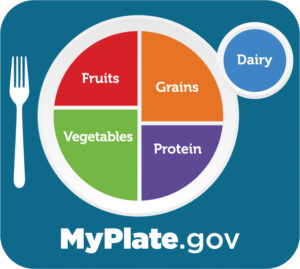MY PLATE~OUR DIET GUIDELINE AND FOUNDATION FOR HEALTH

MY PLATE~OUR DIET GUIDELINE AND FOUNDATION FOR HEALTH
By: Allie Might, FMC, INHC, ATT
March is National Nutrition Month so I thought it would be the perfect opportunity to go back to basics. We all remember when we were growing up and learning about the food pyramid in school. It taught us about the different kinds of foods and how much to eat. Let’s now return to that simpler time and discuss MyPlate.
Every so often, the USDA (United Stated Department of Agriculture) re-evaluates and makes updates or modifications to the food pyramid. This happened a few years ago and they released MyPlate. This show use what is recommended we eat for a healthy diet. While there are guidelines specifically for such things like vegan, vegetarian or even heart hearth, let’s just focus on the traditional and basic MyPlate for this discussion.

MyPlate features the five basic food groups, which include vegetables, fruits, proteins, grains and dairy. They’ve sectioned out a plate to show us what they recommend for a health balanced diet. For example, you’ll see on the image above how it’s recommended that have of your daily intake should consist of fruits and vegetables, with more vegetables than fruit. Keep in mind that these are basic guidelines and may be adjusted depending on one’s specific needs, like vegan diets or if someone is diabetic.
You’ll notice a few groups are missing from MyPlate. These are such things like fats, sugar and even water. While these are important dietary topics, they aren’t considered food groups, and MyPlate concentrates on the five basic food groups. These sub-groups (as I like to call them) are definitely important, and we will discuss them more in depth this month.
Something I do want to add to this is discussion on healthy dietary guidelines to the addition of a multivitamin. These can help enhance the good eating habits we establish for ourselves based on the My Plate recommendations. But which is best? Let’s look at the options.
DAILY MULTIVITAMIN with GRAPE SEED EXTRACT: This is a very basic and easy to take multivitamin. Due to only needing to take one a day, I like to recommend this for anyone new to multivitamins or teens who are just needing a little extra nutrients throughout the day.
MULTI ENERGY POWDER: This is a multivitamin that is very easy to take, as it comes in a powder and just needs to be mixed into water. I like this for any adult, particularly those who just don’t want or like to take too many pills.
CORE MULTIVITAMIN: This is the classic, comprehensive multivitamin. It is made up of a wide variety of essential vitamins, minerals and antioxidants. It’s a great all around choice for any adult.
CORE MEMORY MULTIVITAMIN: This is a new formula that is for those individuals looking for a good multivitamin as well as support for healthy brain and memory function. This is the classic Core Multivitamin with Choline, Ginkgo Leaf Powder and Lithium (as Lithium orotate) added.
MEN’S MULTIVITAMIN: This is a multivitamin specifically made for the needs of men in mind. It is the Core Multivitamin with Maca, Quercetin, Black Cumin Seed and Beta-Sitosterol added. I like to recommend this for men over the age of 40 to help support their specific needs like prostate health and healthy libido.
PERFORMANCE MULTIVITAMIN: This multivitamin was designed for those individuals that lead an active lifestyle or are looking to help support their energy levels. The Performance starts with the Core Multivitamin and adds Rhodiola Rosea Root and Superoxide Dismutase (SOD) to help with energy and endurance. I like this for adults that need a little extra pick-me-up to get through the day.
WOMEN’S MULTIVITAMIN: This multivitamin was made for the unique needs of women. The Core Multivitamin came together with Iron, Collagen Hydrolysate, Purple Corn Flower and Diindolymethane (DIM) to not only supply vitamins, minerals and antioxidants, but to also address healthy iron levels, immune system connective and breast tissues. I like to recommend this for any women still experiencing menses.
As you can see, the foundation of a healthy diet starts with our meals as outlined by MyPlate and then can be enhanced by the right multivitamin. I look forward to getting in depth all month long discussing each food group and “sub-group”. We’ll be seeing how much we need of each and compare the best choices versus what to watch out for. A perfect way to begin spring!
www.myplate.gov/eat-healthy/what-is-myplate
www.hsph.harvard.edu/nutritionsource/multivitamin/
